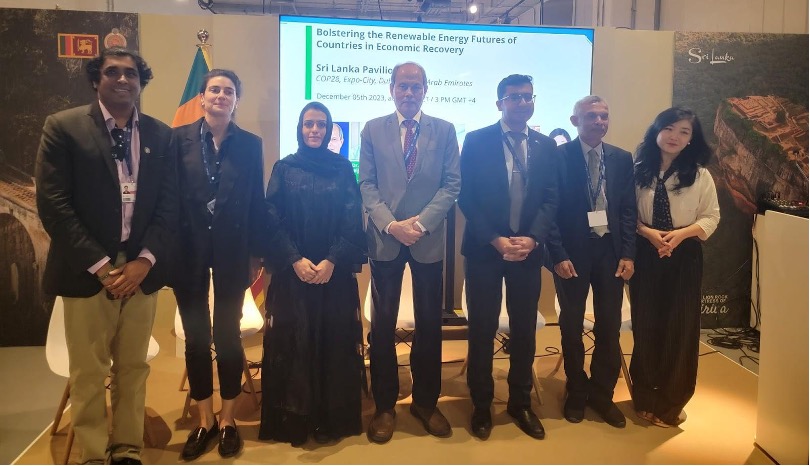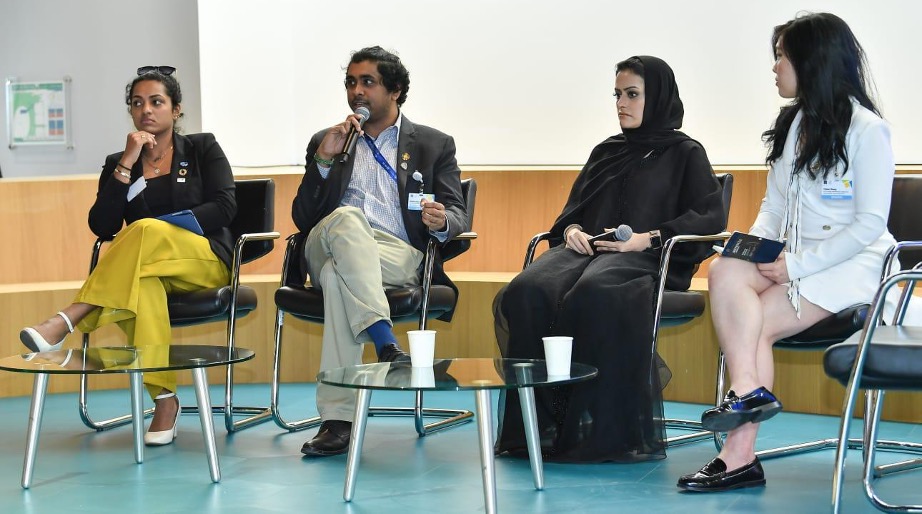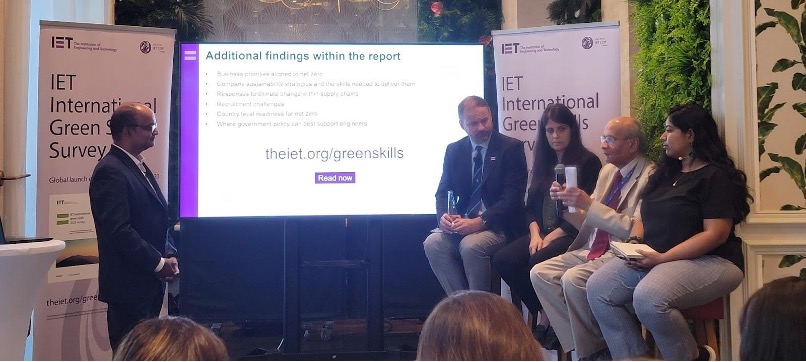IEEE Young Professionals Take a Leading Role at COP28
The role of the IEEE Young Professionals Climate and Sustainability Task Force revolves around fostering engagement and leading initiatives that address climate change–related challenges and potential solutions.
NOTE: The views expressed here are solely those of the author and/or interview subject and do not represent positions of IEEE. Some references may require subscription to access content.

Can you share some insights into your role as the IEEE Young Professionals lead on climate change? How does the IEEE Young Professionals community contribute to addressing climate change, and what specific initiatives or projects have you been involved in?
YP CSTF: We are members of the IEEE Young Professionals Climate and Sustainability Task Force (IEEE YP CSTF). Our role revolves around fostering engagement and leading initiatives that address climate change–related challenges and potential solutions. This includes facilitating technology transfer, promoting academic content related to climate challenges, and encouraging young engineers to participate in the energy transition–related processes. Through the IEEE YP CSTF, we focus on empowering young professionals to contribute to sustainable technology and climate action. We are part of the global SDG7 Expert Review Process conducted through UN Energy. We work closely with the United Nations and the multilateral system to deliver global-level engagement opportunities for the YPs.
Having attended COP28, what were the key takeaways or lessons you learned from the conference regarding the role of technology and innovation in mitigating climate change? How do you see the collaboration between young professionals and established experts shaping the future of sustainable technology?
YP CSTF: Attending COP28, particularly the Sri Lanka Pavilion side event, provided crucial insights into technology’s role in climate change mitigation. The event emphasized the need for robust renewable energy infrastructure, especially for recovering economies. A key lesson was the importance of technology transfer [ 1 ] and investment in enhancing renewable energy capabilities in such countries. This aligns with the broader objective of increasing renewables in power grids [ 2 ] globally. The collaboration between young professionals and experts, as observed at COP28, highlighted the potential for innovative solutions in sustainable technology, particularly through forums like IEEE. This synergy is vital for shaping a sustainable future, with young professionals bringing fresh perspectives to complement the expertise of seasoned professionals.
In your experience, what are the challenges and opportunities that young professionals face when actively participating in global discussions on climate change? How can the IEEE Young Professionals community effectively engage with and contribute to the ongoing efforts to address climate-related issues?
YP CSTF: Navigating the global climate discourse, young professionals encounter both hurdles and opportunities. The challenges include carving out a significant role amidst established entities and bridging the experience gap. Yet, the horizon brims with possibilities for innovation and fresh insights. IEEE Young Professionals, by building alliances with influential bodies like Student Energy, International Renewable Energy Agency (IRENA), International Energy Agency (IEA), the United Nations Framework Convention on Climate Change (UNFCCC), and academic powerhouses like Oxford Net Zero, is crafting an electrifying platform for young voices. This network not only amplifies their impact but also intertwines their vibrant ideas with global efforts to tackle climate issues, creating a dynamic and impactful presence in the environmental arena. IEEE Young Professionals can be conveners of the climate change dialogues, and they can bring together the most important partners of such topics at the global stage.
COP28 likely provided a platform for networking and collaboration. Can you share any impactful collaborations or partnerships that emerged during the conference, particularly those involving young professionals, and how these collaborations are expected to make a difference in the fight against climate change?
YP CSTF: At COP28, the Sri Lanka Pavilion side event catalyzed impactful collaborations, particularly involving young professionals. This platform enabled connections between youth and organizations like IEEE, Global Renewables Alliance (GRA), Clean Energy Solutions Center of the Clean Energy Ministerial (CEM), and IRENA. Most importantly, IEEE 2024 Past President Prof. Saifur Rahman was also present to amplify the impactful engagement. These partnerships are poised to drive significant advancements in renewable energy integration and efficiency, especially in developing countries. The involvement of young professionals in these collaborations ensures fresh, innovative approaches are brought to the forefront of the climate change battle, enhancing the global response to this critical challenge. Also, the members in our task force have been engaged in other activities such as the Global Stocktake activity, which is tracking the global progress to cut carbon emissions.
As the lead for IEEE Young Professionals on climate change, what advice would you give to young professionals who aspire to make a meaningful impact in the field of sustainable technology and climate action? How can they leverage their skills and networks to contribute to the global efforts in addressing environmental challenges?
YP CSTF:
- Network and collaborate: Utilize platforms like COP28 to connect with leading organizations and academic institutions.
- Innovate and contribute: Bring fresh ideas to the table, leveraging the diverse insights gained from collaborations.
- Engage with global efforts: Actively participate in global discussions and initiatives on climate change.
- Leverage academic partnerships: Work with institutions like Oxford Net Zero for research and development in sustainable technologies.
- Utilize professional platforms: Make the most of the IEEE Young Professionals’ network to amplify the impact in the field of sustainability.
- Embrace diversity: Understand that your unique perspective is valuable in driving transformative environmental change.

Dr. Sajith Wijesuriya (Clean Energy Solutions Center of the Clean Energy Ministerial), Ana Rovzar (Global Renewables Alliance – GRA), Dr. Arshi Ayub Zaveri (Trust with Trade Group UAE), Prof. Saifur Rahman (IEEE 2023 President), Kamran Siddiqui (International Renewable Energy Agency – IRENA), Dr. Thusitha Sugathapala (Sri Lanka COP Negotiator), and Yuhan Zheng (IEEE YP CSTF) led a panel at the Sri Lanka Pavilion of the COP28.
[1] J. Timperley, “Green tech transfer is too slow: To help mitigate the effects of climate change on a global scale, there are projects in place to promote the transfer of climate technologies in developing countries. So why aren’t they working?,” in Engineering & Technology, vol. 16, no. 10, pp. 1-2, Nov. 2021, doi: 10.1049/et.2021.1007.
[2] C. Konstantinou, “Toward a Secure and Resilient All-Renewable Energy Grid for Smart Cities,” in IEEE Consumer Electronics Magazine, vol. 11, no. 1, pp. 33-41, 1 Jan. 2022, doi: 10.1109/MCE.2021.3055492.




